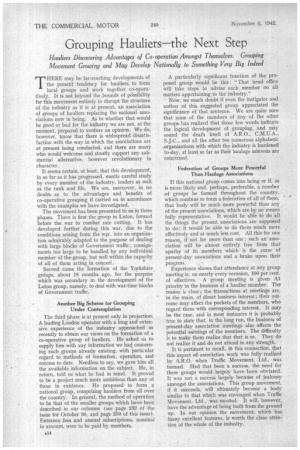Grouping Hauliers the Next Step
Page 16

If you've noticed an error in this article please click here to report it so we can fix it.
Hauliers Discovering Advantages of Co-operation Amongst Themselves. Grouping Movement Growing and May Develop Nationally to Something Very Big Indeed
THERE may be far-reaching developments of the present tendency for hauliers to form local groups and work together co-operatively. It is not beyond the.bounds of pOssibility for this movement entirely to disrupt the structure of the industry as it is at present, an association of groups of hauliers replacing the national asso ciations now in being. As to whether that would be good or bad for the industry we are not, at the moment, prepared to venture an opinion. We do, however, know that there is widespread dissatisfaction with the way in which the associations are at• present being conducted, and there are many who would welcome and stoutly support any substantial alternative, however revolutionary in character.
It seems certain, at least, that this development, in so far as it has progressed, merits careful study by every member of the industry, leaders as well as the rank and file. We are, moreover, in no doubts as to the advantages and benefits of co-operative grouping if carried on in accordance with the examples we have investigated.
The movement has been presented to us in three phases. There is first the group in Luton, formed before the war to combat rate cutting. It has developed further during this war, due to the conditions arising from the war, into an organization admirably adapted to the purpose of dealing with large blocks of Government traffic ; consignments too large to be handled by any individual member of the group, but well within the capacity of all of them acting. in concert.
Second came the formation of the Yorkshire groups, about 18 months ago, for the purpose' which was secondary in the development of the Luton group, namely, to deal with war-time blocks of Government traffic.
Another Big Scheme for Grouping Under Contemplation The third phase is at present only in projection. A leading London operator with a long and extensive experience of the industry approached us recently to obtain our views on the formation of a co-operative group of hauliers. He asked us to supply him with any information we had concerning such .groups already existing, with particular regard to methods of formation, operation, and success to date. Needless to say, we gave him all the available information on the subject. He, in return, told us what he had in mind. It proved to be a project much more ambitious than any of those in existence. He proposed to form a national group, comprising hauliers from all over the country. In general, the method of operation to be that of the smaller groups which have been described in our columns (see page 232 of the issue for October 30, and page 250 of this issue). Entrance fees and annual subscriptions, nominal in amount, were to be paid by members. A particularly significant function of the proposed group would be this : "That head office will take steps to advise each member on all matters appertaining to the industry."
Now, we much doubt if even the instigator and author of this suggested group appreciated the significance of that sentence, We are quite sure that none of the members of any of the other groups has realized that those few words indicate the logical development of grouping, and may sound the death knell of A.R.O., C.M.U.A., S.J.C., and all the other too numerous alphabetic organizations with which the industry is burdened to-day, at least so far as their haulage interests are concerned.
Federation of Groups More Powerful Than Haulage Associations If this national group comes into being or if, as is more likely and, perhaps, preferable, a number .of groups be formed throughout the country, which combine to form a federation of all of them, that body will be much more powerful than any of the present associations, which are by no means fully representative. It would be able to do all the things the present associations are supposed to do ; it would be able to do them much more effectively and at much leg cost. All this for one reason, if not for more than one : such an association will be almost entirely free from that apathy of its members which is the curse of present-day associations and a brake upon their progress.
Experience shows that attendance at any group meeting is, on nearly every occasion, 100 per cent. of effective& A group meeting is given Al priority in the business of a haulier member. The reason is clear; the transactions at meetings are, in the main, of direct business interest ; their outcome may affect the pockets of the members, who regard them with corresponding interest. It may be the case, and in most instances it is probably true to state that, in the long run, the business of present-day association meetings also affects the potential earnings of the members. The difficulty is to make them realize that that is so. They do not realize it and do not attend in any strength.
It is pertinent to recall, ifi this connection, that this aspect of association work was fully realized by A.R.O. when Traffic Movement, Ltd., was formed. Had that been a success, the need for these groups would largely have been obviated. It was not a success largely because of jealousy amongst the associations. This group movement, if it succeeds, will ultimately become a -body similar to that which was envisaged when Traffic Movement, Ltd., was mooted. It will, however, have the advantage of being built from the ground up. In our opinion the movement, which has many excellent features, is worth the close attention of the whole of the industry.




















































